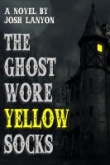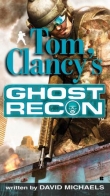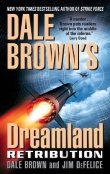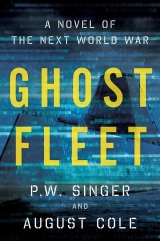
Текст книги "Ghost Fleet: A Novel of the Next World War"
Автор книги: P. Singer
Соавторы: August Cole
Жанр:
Триллеры
сообщить о нарушении
Текущая страница: 23 (всего у книги 37 страниц)
Lotus Flower Club, Former French Concession, Shanghai
Sergei Sechin sat at the edge of the bed and stared at the strands of Twenty-Three’s blue hair sticking out from under the sheet. Against the pink fabric, the hair looked like something found on a coral reef, beautiful and fragile. Then, as the weight of his body pressed down on the mattress, bright red blood started seeping toward him.
He stayed seated as the blood came closer and closer. Had she done it herself, or was this a message to him?
In either case, it meant he was blown. Did he have time to destroy his devices and get a back-alley body scan to see if they had tagged or chipped him? Or should he just run? And yet, what he found himself thinking was that now he’d never know Twenty-Three’s name.
The knock on the door snapped him to attention, and he returned to being the intelligence professional he’d been before he entered the room. Why knock? Perhaps to unsettle him further? See how he would react?
His eyes moved to the corner, where there was a small writing table. He quietly opened the desk drawer and found a pen. It had an ivory inlay set with eight brushed-metal bands and a gleaming silver nib, reflecting the recent fad that had many of China’s most powerful writing letters by hand for the first time in decades. It would have to do.
Aware that he was being watched, Sechin scribbled a note. They would give him time to write it, he knew, thinking it a confession. But it was just a message in Klingon directing them to where they could stick something.
He went back to the bed and sat down, then felt her warm blood seeping into the seat of his pants. He leaned over and kissed her through the wet sheet. As he kissed her, he brushed her hair with one hand and felt his neck for the pulse of his carotid artery with the other. With closed eyes, he tensed up and prepared to jam the fountain pen’s nib into his artery as far as he could and then rip it out.
The door exploded in a spray of fine wooden particles, and the concussion from the blast lifted Sechin off the bed. He crashed face-first into the mirror.
He slumped over at the foot of the mirror, then rolled onto his side, frantically looking for the pen, his ears ringing too loudly for him to hear the faint hum of rubber treads on the floor. The breacher robot rolled up to him, and the gun mounted at its end pointed at Sechin’s neck and fired.
Tiangong-3 Space Station
When they retold the history of this war, no one would believe just how boring the space part of it had been.
They were the true “Warriors of China’s New Century,” as the unit’s commendation letter from the Presidium itself put it. Colonel Huan Zhou had read it to them as they shared a celebratory meal of dehydrated roast pork and mooncakes the day after Tiangong fired the war’s opening salvos. But since then, in a metal box two hundred miles above all the action, little had happened for months.
And for that Chang was thankful. If it was boring, Chang dared not mention it. Huan kept riding them hard, conducting training drills as if they had to shoot down the whole cosmos. There’s nothing left! Chang wanted to shout. All the targets have been serviced!
The only real threat they had faced came from a U.S. Air Force jet – an F-15, Huan said later, flying at its maximum altitude – that had fired an antisatellite missile at the station. The Tiangong’s laser-defense system turned the missile into more space junk and would have lased the plane if it hadn’t had some kind of high-altitude mechanical failure first.
The worst part about that action was that it was all automated. Chang wanted his son to think he was a hero, but the onboard systems had handled the targeting while Chang slept.
He ate another mooncake and gazed longingly down at the blue Pacific.
“Chang,” Huan called. He sounded even more on edge than normal, which perhaps reflected the fact that they’d run out of stims three days earlier. The pace of war in space was so slow, they’d gone through them faster than planned, trying to stay alert. “What is MAGIC array status update?”
“Operative at one hundred percent. No anomalies,” said Chang. Hainan had ordered them to shift the geosynchronous orbits of the surveillance satellites from their position above the central Pacific to an area over the Arctic region. It hadn’t made any sense until the new readings came in.
“It’s still tracking the American East Coast squadron coming from the North Atlantic. Two nuclear-ship readings, all data confirmed received. It seems whatever intel they had was right. The Americans are making one more push, this time up north.”
“I almost admire them. They have to know it won’t work, but the sacrifice is still worthy,” said Huan. “Near space clear?”
“Exclusion zone intact. The German comsat launched out of Sudan last week made sure to stay extra-wide. I think it’s a broadcast bird,” said Chang. “I can check the intel reports again.”
“Make sure you do. We want no surprises,” said Huan.
The Directorate had declared a two-hundred-kilometer zone of exclusion around Tiangong. The Germans had apparently learned their lesson three weeks ago after a Belgian weather satellite had wandered into the zone and been lased into a molten ball of junk.
“Today’s traffic?” asked Huan.
“A slow day. Intelligence reports two launches expected: an unmanned Russian replenishment vehicle for the ISS and one of those space-tourism flights from the European spaceport in French Guiana,” said Chang.
“War-zone tourists. In space! Such idiots. Let me check with Hainan to see if we can service that target, maybe make their trip even more exciting,” said Huan, laughing.
Huan’s braying laugh was one of the most trying aspects of life aboard the station for the entire crew. Was it bloodlust or boredom that drove Huan?
“And I will inquire about the resupply. You know, Chang, there may be fresh crew coming.”
Home.
“I’ll leave only when you leave, sir,” said Chang, hoping those words would be enough. If Huan thought he wanted to leave, Chang knew he would be the last to get off the station.
“Naturally,” Huan replied.
Chang closed his eyes and waited. He was good at waiting. He thought about his son: What was he doing at this moment? Were his eyes closed too? Chang began to hum a song he used to sing to his son when he was a baby.
A steady ping snapped him to attention. The station’s flight-tracking systems had detected a change of course by the tourists’ space plane.
Chang wiped his eyes with the back of his hand and stared hard at the screen again. No. That couldn’t be. It was heading straight toward the exclusion zone.
USS Zumwalt, North Pacific Ocean
“All stop!” shouted executive officer Horatio Cortez.
As the USS Zumwalt slowed, the black smoke coming up from the bow section of the ship blocked out the view of the nearly flat Pacific Ocean.
“Who gave the order to stop?” asked Captain Simmons, wanting to yell but producing more of a wheeze, as he had to catch his breath. He’d dashed up from the engine room, where he had been talking to the crew about how to get a few more knots of sprint speed out of the ship. “What the hell is going on, XO?”
“It’s some kind of internal explosion,” said Cortez, eyes flickering behind his glasses as he watched the ship give an automated damage report. “Fire-suppression system is working, should be under control any moment.”
The smell of burning plastic started to waft through the bridge.
“No sign of an attack. ATHENA says battery fire,” said Cortez in the clipped voice he used during high-stress situations.
“Then we can start moving. We have a schedule to keep!” said Simmons. He turned and left the bridge, and there was no doubt in anyone’s mind that he was headed to find the source of the problem.
As he rushed below decks, the calls of “Captain!” and “Make a hole!” echoed down the ladder wells and passageways. He could never catch up to the crew’s warnings to the others that he was on his way and they should look shipshape.
As he got deeper into the ship, the calls ended. Damage-control teams rushed back and forth, focused on their work. A caterpillar-like fire-suppression bot crawled past, and Simmons tucked in behind it as the crew made way for the machine’s steady slink toward the rail-gun battery.
Simmons felt a hand on his shoulder pull him back.
“Captain, they’ve gotten it extinguished,” said Mike. “I mean, she’s gotten it extinguished. The Z’s fire-suppression system took care of it. If only one thing works right on this ship, I guess it’s good it’s the sprinklers.”
“I need to talk to Dr. Li, help her light a fire under the power team’s asses,” said Simmons.
“Son – I mean, sir – let me handle this,” said Mike. “Not much you can say to her or any of the crew to make them move faster. This one’s for me and Vern.”
“Chief, it’s my ship, my mission,” said Simmons.
“I told you to stop personalizing it. It’s the Navy’s ship, not yours. That’s what the best captains learn,” said Mike. “You think anybody’s going to go easy on themselves now? You keep everyone busy upstairs and let me get my hands dirty down here. You’re going to have your hands full soon enough.”
Jamie didn’t answer. He didn’t want to admit his father was right.
Tiangong-3 Space Station
“Turn off the damn alarm,” said Colonel Huan. “I can see them.”
Chang saw him searching the shoulder pocket where his stim tabs had been before they’d run out.
They’d just given the third warning to the space tourists, and again no response.
“Should I try Hainan control center again, Colonel?” said Chang. This was clearly a civilian target, and the shuttle belonged to a European nation that the Directorate had hundreds of billions in trade with. More important, that nation was a former ally of the United States that had so far stayed out of the war. But that wasn’t what was troubling him. Destroying satellites was one thing, but lasing a shuttle full of rich tourists was not the war he wanted to tell his son about.
Huan grunted his approval. The long-range communications appeared to be jammed, the transmissions digitally hopping across each of the frequencies they tried.
“It doesn’t matter. We don’t need Hainan’s approval. The jamming only proves they are a threat,” said Huan. “Proceed with station defense protocols. Set them to begin firing at two hundred kilometers.”
“Wait, wait. I’ve got a transmission coming through,” said Chang. “It’s… music?” He set the transmission to play on the station’s speakers: first there were the strums of a single guitar, then a beating of drums, and then a gravelly voice singing in English.
Out of the blue came a kill-crazy crew,
Whose motto was stomp on the weak,
With bones in their hairs,
They were as hungry as bears,
And their leader was the King of the Freaks.
“What? What does that mean?” said Huan. For once he seemed to have no ready answers.
Chang directed the computer to match the lyrics to all records of codes and transcripts, even military anthems, thinking it might be a unit’s marching cadence. The system’s answer made the music even more confusing. There was nothing in the classified files, but an open-source search had found a match. It was a song performed by a twentieth-century musician called Alice Cooper.
“This is Directorate space station Tiangong calling unidentified spacecraft ordering immediate course correction to avoid our exclusion zone,” said Chang. “You will be fired upon if you advance further. Answer to confirm receipt.”
The order was met with more blaring rock-and-roll.
Death on their hips,
There was foam on their lips,
And behind them a shadow of blood,
They was Space Pirates.
The rock-and-roll song continued on to describe a sort of bizarre savagery that barely made any sense in the highly engineered confines of the space station.
“They can’t even bother to turn off their awful music?” Huan said. “Now I am certain they are Americans. What an expensive way to commit suicide.”
“They will cross into the exclusion zone in ten seconds,” said Chang.
“Good,” said Huan. “Then we won’t have to listen to this racket for much longer.”
Chang noted that Huan pressed down the red firing button almost a full second before the target crossed the imaginary line in space. Either the music had gotten to him or the bastard just couldn’t wait to kill real people.
But then – nothing.
“Are the lasers functioning?” said Huan. “There’s no damage.”
“Sensors are properly tracking the target, showing a hit at the aim site,” said Chang.
Huan pressed the red button again, jabbing it hard, as if the added pressure would make it work this time.
Again, the target showed no damage. It was as if they’d never fired a shot.
“Full systems reset. Now,” Huan commanded
“Target is decelerating,” said Chang.
“I want to see it up close,” said Huan, pointing toward what he thought was the space plane, although actually his finger was aimed at the station bulkhead. The virtual image of the targeting goggles did that to some people. They simply forgot where they were.
The screen shifted from the radar-targeting icon to a visual from the station’s telescope. As it focused, Chang thought the shuttle was the shiniest thing he’d ever seen.
And behind them a shadow of blood,
They was Space Pirates
The song continued repeating. He’d lost track of how many times it had played.
“System rebooted. Back online.”
Huan fired again, and they saw a quick bright dazzle at the target point but no burn-through.
“It’s got some kind of a reflective coating that’s causing the laser energy to bounce off,” said Chang.
“We’ll see how many shots it can take as it gets closer,” said Huan.
“Sir, the range is making it dangerous for us. The closer they get, the more likely that one of our shots will reflect back and hit us,” said Chang.
Huan didn’t answer, just pressed down on the red button; the laser fired once more.
There was no effect, and the beam fortunately didn’t angle back at them. The plane began to decelerate and came to a stop three kilometers away. It fired its maneuvering jets, tiny bursts of flame, setting itself in a parallel orbit to the station, out of the laser’s firing angle. As the shiny plane lazily rotated, the wings came into full view.
“What is that?” said Huan, though he recognized what he was seeing.
“A skull,” said Chang. “And two bones crossed beneath it.”
They was Space Pirates
Sack a galaxy just for fun.
Then the music stopped, and the station went silent.
A voice with a strange accent came on, sort of a cross between an Indian’s and a British noble’s from one of those old shows Chang’s wife loved, about the servants living below stairs in the manor.
“Tiangong, Tiangong. I have the pleasure to be Sir Aeric Cavendish, captain of the legally registered privateer Tallyho,” said the voice. “And I demand your surrender.”
Ehukai Beach, Oahu, Hawaii Special Administrative Zone
He’d grown up in a twenty-two-story apartment building in Chengdu, but the booming surf always made Bo Dai homesick. It reminded the big Directorate sergeant of the New Year’s fireworks when he was a child. He could never admit this to the others in his unit, but he wished he were back home. The fun of this so-called tropical paradise had long since worn off, right around the time they’d found poor little Xiao Zheng dead in the bar, his neck stabbed through.
The bulky marine walked carefully at the edge of the lapping ocean water, placing one foot in front of the other right where the fresh sand was wiped clean with each pulse of the ocean. He looked over his shoulder to be sure that nobody caught him in such a forlorn mood. Even in the dark, the sag of his shoulders would have been a giveaway to the other marines, who feared him.
It was the beauty that did it. For somebody who did not spend much time reflecting, he’d come to understand that Hawaii’s best weapon against any occupier was its beauty. It made you let down your guard.
He had told his men living out of the beachfront houses near Ehukai Beach that he needed to make sure the guards at the far point weren’t sleeping during watch. This was a rest-and-relaxation assignment after the past few weeks of tough urban patrols, his men not knowing if that kid in the alley was just taking out the recycling or getting ready to toss a Molotov cocktail their way. The beach, known as the Banzai Pipeline to the local surfers, was too rough for landing craft and too open for any of the damn insurgents to use as a hideout. He knew it was safe ground. But the men knew these facts also, and Bo worried his unit would become slack. He would find out in a few more minutes if he had to dole out another beating in order to encourage better attentiveness.
A few paces behind Bo and about thirty feet from shore, a pair of straw-like antennae emerged from the choppy water. They twitched and then disappeared.
As Bo walked on, lost in his thoughts, the antennae reappeared ten feet from the shore, then quickly vanished again. They emerged again at the water line, attached to a small black lobster. It advanced by alternating between crawling along the ocean’s bottom on its eight legs and using the force of the water’s swell to help it glide toward the shore.
Bo continued to walk along the beach, his body armor, weapon, and helmet a dark silhouette against the sky. The lobster began to stalk its prey, starting and then stopping again, the water covering it.
Bo thought he heard something and pivoted on his heel. He flipped down his night-vision goggles but saw nothing moving in the tree line.
As the lobster made a final sprint to close in on its prey, Bo instinctively turned, swinging his rifle out toward the dark ocean. Nothing but the water splashing around his boots. He brought the rifle down and cursed himself for being so jumpy.
The water receded, revealing the small lobster a few feet away, its body covered in matte, sandpaper-rough, purple-black ballistic carbon. Before Bo could react, the robot fired a small dart into his leg, dropping him instantly. The poison was a synthetic derivative of a sea snake’s venom and had him unconscious within a second.
As he lay face-down in the water, drowning, six dark figures emerged at the waves’ break line and bodysurfed their way ashore. They slowly eased past Bo, crawling on their stomachs and elbows to the water line. Then they waited, scanning the beach for threats, holding suppressed HK 416 rifles. They wore ultrathin wetsuits that matched their heat signatures to the ambient temperature of the water around them. They were almost invisible to the naked eye, lacking the telltale humps of rebreathing units. They had made the hour-long swim to shore without oxygen tanks, their bodies flush with trillions of micron-size nanoscale devices that provided far more oxygen than normal red blood cells. The technology had first hit the mainstream at the Tour de France three years ago, causing the race to go on indefinite hiatus but piquing the interest of DARPA program managers working on human-performance modification.
After waiting for ten minutes in the surf, the six dark figures slithered one by one into the trees. Two of them dragged Bo’s body deep into the thick undergrowth of mangrove trees.
The lobster scurried along the beach, following Bo’s path, darting back to the water when the moon broke through the clouds in order to avoid the splash of light on the sand. Then the machine crept carefully forward as a single figure emerged from the forest at the turn in the shoreline.
The robot beamed the image back to the six who’d taken cover. Even on the small view screens of their tac-glasses, they could see the fatigue of the person coming out of the trees. The figure wore torn clothes and walked with an obvious limp.
The robot scuttled forward and then paused ten feet behind the figure. One of the hidden commandos hissed a challenge through a tiny speaker set in the robot’s carapace.
“Sugar Bowl Resort.”
“Best skied in February,” responded the figure, slowly turning, pointing a Chinese-made QBZ-95 automatic rifle at waist level and then noticing the tiny robot below.
Fifty feet away, one of the dark figures stood, two open hands in the air, and remained motionless until the rifle was lowered.
“Aloha and welcome to paradise. I’m Major Doyle, Twenty-Second Marine Air Group but more recently, ah, detailed to what we call the North Shore Mujahideen.”
“We’re familiar with your work. Hell, you’re a celebrity back home, Ms. Die Screaming,” said the man, who was clad in a green, gray, and black tiger-striped wetsuit. “I’m Duncan, proud member of the Dam Neck Canoe Club. It is an honor to meet you.”
Conan considered the reference to the U.S. Navy base in Virginia and the fact that he hadn’t given a last name or rank.
“SEAL Team Six for an extraction team? I guess it’s me that should be honored.”
“I believe there may be some confusion, Major Doyle,” said Duncan. “Who said we were your extraction team? We’re the advance party.”

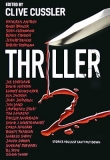
![Книга [Magazine 1966-07] - The Ghost Riders Affair автора Harry Whittington](http://itexts.net/files/books/110/oblozhka-knigi-magazine-1966-07-the-ghost-riders-affair-199012.jpg)
